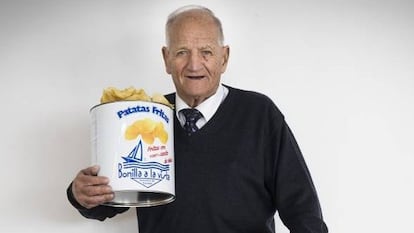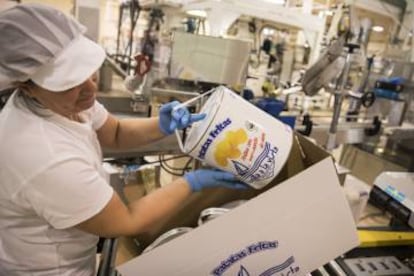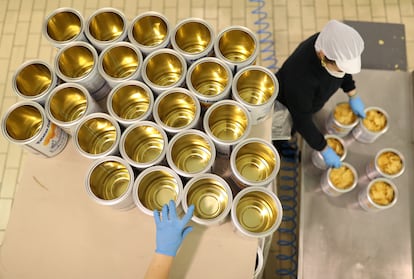The story of the Spanish potato chip that walked Hollywood’s red carpet
Sales of the Bonilla a la Vista brand, which is still family-owned, have skyrocketed in Spain after the South Korean movie ‘Parasite’ triumphed at the Oscars


There’s an image that expresses the delirium that Bonilla a la Vista potato chips, a family-owned brand from northwestern Spain, caused when they arrived in South Korea in April 2016.
As though rationing for war, a line of women at the Hyundai department store in Seoul can be seen each holding two 500-gram cans of the snack. The line moves forward in an orderly fashion as the women finally pay and take their coveted product home. The first ship loaded with the chips had arrived in the country after a 42-day journey, and the docking had been broadcast on Korean television.
But there wasn’t enough supply to satisfy the huge demand created by the Korean distributors that had discovered them after a trip to Spain, so the supermarket created a rule: each customer could take two cans. Just two. The chips sold out after just a couple hours. A woman with a child in her arms upheld the minor’s rights: “Two people, four cans.”

The owner of the factory speaks enthusiastically about the times, back when he was a young man, when he would deliver chips to local bars on his red Guzzi motorcycle. César Bonilla is now 87 years old and the son of Salvador Bonilla, who founded the brand months before his son was born in 1932.
Bonilla recounts how the family opened its first churro store in Ferrol, in the northwestern region of Galicia. Then came a hotel, but the business venture failed. And then, one day after the end of the Spanish Civil War (1936-1939), the family had to leave their home town “with nothing but the clothes on our backs.”
Never losing his train of thought, Bonilla talks about how they started over in A Coruña, where they now have six churro shops, and about the nights that he spent alone, slicing thin strips of potato. He recalls the Spanish omelettes that their mother prepared the next morning with the scraps that they didn’t use to make the potato chips the night before. And then there was the day when a businessman ordered 100,000 bags for the visit of Pope John Paul II in 1989, and then thoughtlessly returned the 40,000 he hadn’t sold.

Bonilla also describes in great detail how one day an immigrant who fell in love with their product asked for help to set up a churro shop in Venezuela, and so he went there to set up some machines. But Bonilla has often turned down offers to turn their brand into a franchise, because “quality requires control, and this becomes more difficult with distance.” In fact, a South Korean group sought to replicate the formula and they wanted it so badly that they had “already picked out business premises,” but the company said no and that ship never sailed.
Today, this lover of the sea – who is a former underwater fishing champion, once owned several sailboats and now rides in a motor boat – continues to captain the factory he founded in 1988, without his father’s blessing, in order to resume manufacturing potato chips. At that point, the family patriarch had turned his back on potatoes three decades earlier in order to focus on churros.
These days, inside this same factory, César Bonilla hosts school field trips and, lately, dozens of reporters attracted by the unsought publicity the brand received through the Oscar-winning Korean movie Parasite. Today, Bonilla is also receiving a team that wants to shoot a documentary.
On the night of the Academy Awards in Hollywood, the factory workers on the 4am shift were already frying the dough to make 23,000 churros when Parasite was announced as the winner in the Best Picture category. There is a scene in the movie where, as a glamorous indicator of the family’s wealth, one sees the unmistakable white can of potato chips with the blue sailboat on a wavy sea, above which are inscribed the words “Bonilla a la Vista.”

These are the words (in English, “Bonilla in Sight”) that Salvador Bonilla used to call back, military-style, when a sailor called out “Who goes there?” in the middle of the night at the port of Ferrol, where he was stationed. The use of cans for packaging, however, was the son’s decision when he set up the factory, because that way they wouldn’t break on the back of rattling motorcycles on their way to the local bars.
On the morning of the interview with EL PAÍS, a local woman who César Bonilla doesn’t know personally, full of pride for A Coruña, has sent him an crochet doll that sits behind a similarly crocheted counter holding miniature cans of chips, which of course are crocheted as well. Bonilla places the gift, still wrapped in clear cellophane, on the shelf in his office next to a cluster of trophies and historical photos of his business. A portrait of his mother depicts her frying churros and potatoes at the Ferrol festival of 1932, pregnant with her son.
Internet sales have increased 150% and the usual distributors have been joined by many others
For movie viewers in South Korea, it wasn’t surprising to see a can of Bonilla a la Vista in Bong Joon-ho’s comedy thriller. But in Spain, the success of the film has overwhelmed the Arteixo-based factory which, despite producing 540 tons of potato chips annually and exporting 60 tons to 20 different countries (40 of them to Korea), looks small and simple next to its huge neighbor in this industrial park: Inditex, owner of Zara and other fashion brands.
The subsequent media coverage has done the rest. Internet sales have increased 150% and the usual distributors have been joined by many others. They are new customers who discovered Bonilla a la Vista much later than the Asian country, where customers pay around €25 for a half-kilo can that can be purchased in Spain for €13. With the demand increasing, they have had to hire more factory workers to create an additional shift.
But the potato chips are still being made the way they always have. First they are run through salt-water and then fried at 170ºC in virgin olive oil made by a company named Abril, which is based in Ourense, another Galician city. The frying is done indirectly through a double boiler system so that the direct heat doesn’t deteriorate the quality. A scanner that was made in Holland, which factory workers humorously call the “magic eye,” picks out the chips that don’t come out golden, the ones that are too small, or those that came out broken or folded. “Look at everything that bastard throws out!” the owner jokes as he passes by the waste container. “The secret is to keep doing things the same way, and to never change the raw materials,” he says. “Taking shortcuts is a constant temptation in this business because it’s easy, but you simply can’t do it.”
English version by Nell Snow.
Tu suscripción se está usando en otro dispositivo
¿Quieres añadir otro usuario a tu suscripción?
Si continúas leyendo en este dispositivo, no se podrá leer en el otro.
FlechaTu suscripción se está usando en otro dispositivo y solo puedes acceder a EL PAÍS desde un dispositivo a la vez.
Si quieres compartir tu cuenta, cambia tu suscripción a la modalidad Premium, así podrás añadir otro usuario. Cada uno accederá con su propia cuenta de email, lo que os permitirá personalizar vuestra experiencia en EL PAÍS.
¿Tienes una suscripción de empresa? Accede aquí para contratar más cuentas.
En el caso de no saber quién está usando tu cuenta, te recomendamos cambiar tu contraseña aquí.
Si decides continuar compartiendo tu cuenta, este mensaje se mostrará en tu dispositivo y en el de la otra persona que está usando tu cuenta de forma indefinida, afectando a tu experiencia de lectura. Puedes consultar aquí los términos y condiciones de la suscripción digital.








































